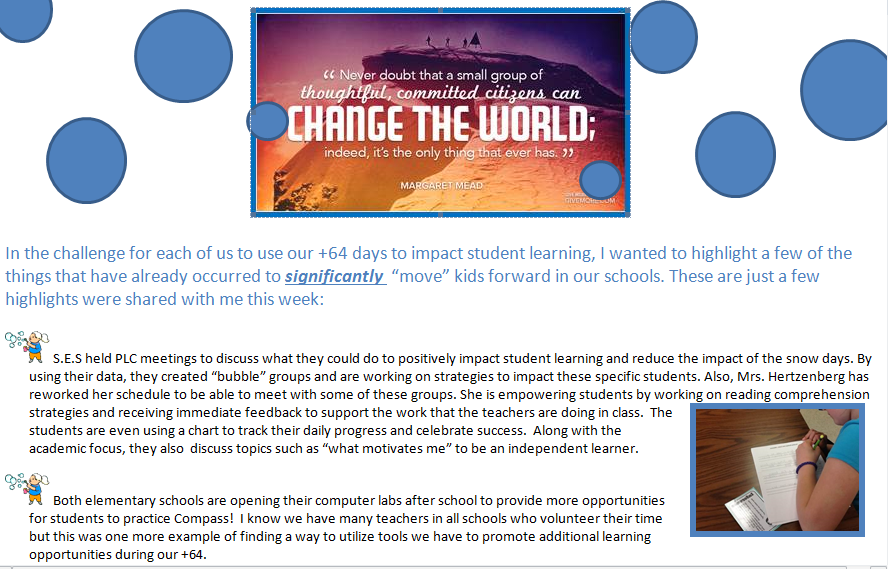
This blog highlights my fortunate view as a Kentucky Educator. As the Executive Director of NKCES, I have the opportunity to see many great educators in action throughout Northern Kentucky. We are "moving to the edge" and taking positive risks for students. We invite you to join us-- there is always plenty of room! #NKY~TheBestPlaceToLearn
Monday, October 27, 2014
Early Childhood Forum
We are building momentum with our early childhood message
and as part of our "challenge" we are building a common language for
the top 5 things we can communicate to build early literacy skills. If all of
our leadership team promoted the same 5 strategies and then if all of our
community members could communicate the same 5 strategies to our youngest
residents/family members....Could we impact 10 more students this year, 20 more
students the next and so on with a common message around literacy.
For more information, please come to our Early Childhood Forum on November 18, 2014!!

Sit and read together EVERY DAY
Before
starting school, an average kindergartener should have 1000 books read to them.
20 minutes of
daily reading significantly increases a child’s reading achievement.
Talk using new words
The average
kindergartener should be exposed to 30 million words before starting school.
The size and effective use of a child’s vocabulary is an
important indicator of future literacy ability.
Ask questions as you read
Ask questions as you read
The goal of
reading is to make meaning. Asking your child questions before, during, and
after reading fosters comprehension.
Recite rhymes, sing songs -repeat
Recite rhymes, sing songs -repeat
Rhymers are
readers: Nursery rhymes build memorization, sequencing, voice inflection, and
exposure to new words.
Repetitive
reading builds word recognition and confidence.
Take time to point out print EVERYWHERE
Children who live in print-rich environments and who are read to during the first years of life are much more likely to learn to read on schedule.
Take time to point out print EVERYWHERE
Children who live in print-rich environments and who are read to during the first years of life are much more likely to learn to read on schedule.
Never too early- read to infants because learning begins at birth
One-to-one attention and nurturing encourages a love for reading
With your commitment, the building blocks of literacy are free
With your commitment, the building blocks of literacy are free
Celebration
Test scores are just one measure of student in growth in Pendleton County Schools but we are celebrating exceptional growth for the 2013-14 K-Prep results. We are fortunate to have so many teachers and leaders, along with community members who put kids first. Congratulations to everyone on significant growth!!
|
District
|
2012-13
|
2013-14
|
Difference
|
|
Overall Score
|
64.9
|
66.7
|
+
1.8
|
|
Percentile
|
50
|
62
|
+12
|
|
MET AMO: Yes Needs improvement/Progressing
(Note: Proficiency
67.5=0.8 away from proficiency)
| |||
Tuesday, August 19, 2014
The Zipcode Lottery
THIS IS A MUST WATCH: ZIPCODE LOTTERY !
One of the most important predictors of school success and high school graduation is grade-level reading by the end of third grade. This short video clip puts it all into perspective....AND hopefully lights a spark to be an active part of the solution for your community!
The Campaign for Grade-Level Reading (www.http://gradelevelreading.net) is a collaborative effort by foundations, nonprofit partners, states and communities across the nation to ensure that more children in low-income families succeed in school and graduate prepared for college, a career, and active citizenship. The Campaign focuses on the most important predictor of school success and high school graduation—grade-level reading by the end of third grade.
Research shows that proficiency in reading by the end of third grade enables students to shift from learning to read to reading to learn, and to master the more complex subject matter they encounter in the fourth grade curriculum. Most students who fail to reach this critical milestone falter in the later grades and often drop out before earning a high school diploma. Yet two-thirds of U.S. fourth graders are not proficient readers, according to national reading assessment data. This disturbing statistic is made even worse by the fact that more than four out of every five low-income students miss this critical milestone.
Although schools must be accountable for helping all children achieve, providing effective teaching for all children in every classroom every day, the Campaign is based on the belief that schools cannot succeed alone. Engaged communities mobilized to remove barriers, expand opportunities, and assist parents in fulfilling their roles and responsibilities to serve as full partners in the success of their children are needed to assure student success.
Monday, August 11, 2014
Little things that make a big difference!
Tuesday, April 1, 2014
Instructional Rounds for PCS
Instructional Rounds were also held at PCHS and the
leadership team met with teachers to analyze the next step documents. Mr. Simms
shared the overall process with the teachers and Mr. Dietrich closed the
meeting by having teachers reflect on the feedback and complete an exit slip.
Each teacher then identified their top 2 needs and their next moves on an exit
slip. He now has a written commitment from teachers of their “next steps” in
moving PCHS to the next level!
Subscribe to:
Posts (Atom)









